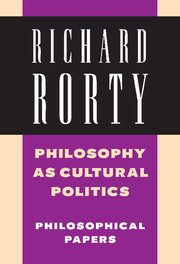Book contents
- Frontmatter
- Contents
- Preface
- Acknowledgments
- I RELIGION AND MORALITY FROM A PRAGMATIST POINT OF VIEW
- II PHILOSOPHY'S PLACE IN CULTURE
- III CURRENT ISSUS WITHIN ANALYTIC PHILOSOPHY
- 9 A pragmatist view of contemporary analytic philosophy
- 10 Naturalism and quietism
- 11 Wittgenstein and the linguistic turn
- 12 Holism and historicism
- 13 Kant vs. Dewey: the current situation of moral philosophy
- Index of names
10 - Naturalism and quietism
Published online by Cambridge University Press: 05 June 2012
- Frontmatter
- Contents
- Preface
- Acknowledgments
- I RELIGION AND MORALITY FROM A PRAGMATIST POINT OF VIEW
- II PHILOSOPHY'S PLACE IN CULTURE
- III CURRENT ISSUS WITHIN ANALYTIC PHILOSOPHY
- 9 A pragmatist view of contemporary analytic philosophy
- 10 Naturalism and quietism
- 11 Wittgenstein and the linguistic turn
- 12 Holism and historicism
- 13 Kant vs. Dewey: the current situation of moral philosophy
- Index of names
Summary
Philosophy is an almost invisible part of contemporary intellectual life. Most people outside of philosophy departments have no clear idea of what philosophy professors are supposed to contribute to culture. Few think it worth the trouble to inquire.
The lack of attention that our discipline receives is sometimes attributed to the technicality of the issues currently being discussed. But that is not a good explanation. Debates between today's philosophers of language and mind are no more tiresomely technical than were those between interpreters and critics of Kant in the 1790s.
The problem is not the style in which philosophy is currently being done in the English-speaking world. It is rather that many of the issues discussed by Descartes, Hume, and Kant had cultural resonance only as long as a significant portion of the educated classes still resisted the secularization of moral and political life. The claim that human beings are alone in the universe, and that they should not look for help from supernatural agencies, went hand-in-hand with the admission that Democritus and Epicurus had been largely right about how the universe works. The canonically great modern philosophers performed a useful service by suggesting ways of dealing with the triumph of mechanistic materialism.
But as the so-called “warfare between science and theology” gradually tapered off, there was less and less useful work for philosophers to do.
- Type
- Chapter
- Information
- Philosophy as Cultural PoliticsPhilosophical Papers, pp. 147 - 159Publisher: Cambridge University PressPrint publication year: 2007
- 4
- Cited by



